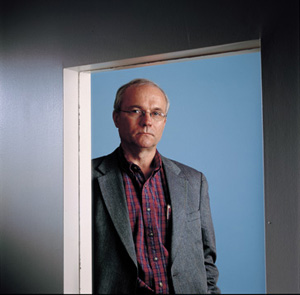The president’s pollster talks about health care and the American voter
Photo:Mike Morgan |
|
 |
|
Angst about heath care is the sleeping giant of american politics, says Jan van Lohuizen, the principal pollster for the Bush campaign. Though concerns about the economy, terrorism and war in Iraq dominated the 2004 presidential race, van Lohuizen believes the focus will shift in future campaigns. Looking ahead, he believes that by 2008 health care will be the dominant issue in the presidential race.
Along with polling for the Bush campaign in 2004, van Lohuizen’s firm, Voter Consumer Research, does survey research for the Republican National Committee, Senate Majority Leader Bill Frist (Tenn.) and other GOP leaders. Van Lohuizen spoke with Stanford Medicine about the American electorate and health care.
You’ve said that health care is the sleeping giant issue for the American electorate. How so?
Van Lohuizen: Concern with health-care cost and access have increased steadily over the last few years, as more people have no coverage at all, and as people who do have it are required to pay more for it. This concern has not become a front-and-center domestic policy issue yet; emphasis on not yet, because other issues have been a greater concern: domestic security, the war in Iraq, the economy, all are issues that currently are a higher priority. However, as the economic recovery continues, and, hopefully, as the conflict in Iraq subsides, I fully expect health care to become the top issue, if not by ’06, then almost certainly by ’08.
What does the average American most want to tell their political leaders about health care?
Van Lohuizen: “Do something.” I don’t think the voters know what the fix is, or even if there is one, but they sure want to see action. The voters are not in the mood to do just anything, however. The California electorate voted on four different initiatives that dealt with health care in one fashion or another and was quite selective in its choices.
When it comes to addressing the most pressing problems of health care, are Americans looking for major reforms or incremental changes?
Van Lohuizen: Voters are realistic about the complexity of the issue and (at least Californians) are willing to pick and choose the fixes. I think incrementalism will satisfy them.
What do we know so far about seniors’ attitudes toward the new drug benefit program authorized by the Medicare Prescription Drug Act of 2003?
Van Lohuizen: The initial results suggested seniors were deeply unhappy. We are now seeing data that suggests this is changing. It is not so much that seniors are now happy, as that they are less unhappy. The arrival of prescription drug benefits may have something to do with it, but that is only a guess.
When Americans describe the state of health care in the nation, are there any words that stand out?
Van Lohuizen: Yes: cost. In addition, there’s something that cannot be pinned down as precisely. If you had to use a single word it would be “uncertainty.” People who do have coverage are deeply concerned that they might lose it or that the cost will increase to such an extent that they cannot afford it. People are concerned that at some time in their working lives they will not have any coverage, and this is a seriously scary prospect, even if their current situation is OK.
Is it accurate to assume that when it comes to health care America is not divided blue or red?
Van Lohuizen: Not quite: if you ask what the problems are, blue and red voters agree; but if you ask them to rank health care relative to other priorities, blue voters tend to rank it higher than red voters. The red/blue differences increase when you ask people how to address these problems.
What most surprises you when you talk about health care with Americans?
Van Lohuizen: From my personal experience the greatest loss in our health-care system is the personal relationship between physicians and patients. Voters are concerned about this, but to a far lesser extent than I think they should be.
Are Americans more interested in questions of cost or questions of quality?
Van Lohuizen: Americans are used to having both and think they are entitled to both reasonable cost and high quality. The public does not appear to see a decline in quality but does see enormous cost increases. Right now cost is the issue because the public believes it is getting quality care.
So who do Americans blame the most for the health-care crisis?
Van Lohuizen: Everyone, with the possible exception of physicians: drug companies, HMOs, insurance companies, trial lawyers, etc. We see some signs that voters are blaming other patients: overuse, unnecessarily expensive use, misuse of emergency rooms, fraud in the system, etc.
Who’s most trusted on questions of health care?
Van Lohuizen: Physicians continue to be the most credible. Also very credible: nurses.
Who’s got a lot of explaining to do?
Van Lohuizen: HMOs and drug companies. People truly don’t see why their costs should be that much higher or why HMOs are so profitable.
Think about the midterm congressional elections in 2006.As far as health care, will voters be evaluating incumbents on any short-term progress between now and then?
Van Lohuizen: So far voters have evaluated effort more than results. Voters understand these are complex issues and are realistic in their expectations. Whether this will change to a more results-oriented evaluation remains to be seen.
Is there any one individual who has a lot of political capital with the American public when it comes to talking about health care?
Van Lohuizen: It used to be C. Everett Koop. Not sure
who that would be today, or if there is one such person.
Comments? Contact Stanford Medicine at

